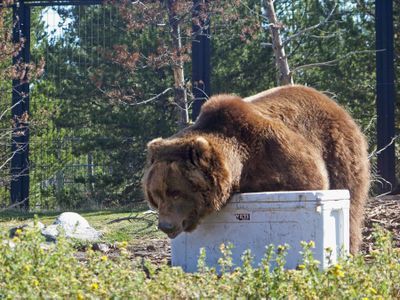New coolers can resist bear abuse

HELENA – Keeping cold ones cold when camping in grizzly bear country may be getting a bit easier.
New coolers from a Florida company and a business in Texas that have passed federal and state tests for resistance to grizzlies are the first to be mass-produced. So, local officials willing, adventurers with a boat or a pack animal hefty enough to carry a cooler no longer must hang it 10 feet off the ground to comply with food-storage rules in the backcountry that grizzlies inhabit.
Wildlife managers have long required that campers in grizzly territory keep food and beverages out of bears’ reach – in a vehicle, building or special locker; suspended from a tree or pole; or protected by portable electric fencing. The rule, which applies when campsites are unattended and in some places when campers are asleep, is intended to keep humans safe and bears healthy.
Hanging a cooler is an especially “significant project” at the start of a trip, when it’s full and can weigh 100 pounds, said outfitter Brett Todd, who puts clients on horses – and their gear on mules – for trips into Montana’s Bob Marshall Wilderness Complex.
Five orphaned and nuisance bears who make their home at the Grizzly and Wolf Discovery Center in West Yellowstone tested the new coolers for a group called the Interagency Grizzly Bear Committee, which includes representatives from U.S. and Canadian wildlife agencies and from the states of Montana, Wyoming, Idaho and Washington.
The bears beat and scratched at each cooler for an hour. Despite smelling the peanut butter and fish stored inside, they failed to break into the boxes, made of the same tough plastic used in kayaks. Even the 100-pound weights that human tormentors dropped on the boxes didn’t crack them open.
Short term, this was bad news for the bears: No treats.
But in the long term, the test results were as important for grizzlies as for humans. Bears that grow accustomed to finding food and beverages at human encampments are often declared a nuisance and eventually moved or even killed.
The hope is bear-resistant coolers will prevent more bears from learning that coolers can be sources of food. Even if bears can detect the smell of food, they are unlikely to stay interested in a cooler if they cannot break into it quickly, said Jack Rich, another Bob Marshall outfitter.
“It’s not about the smell, it’s about the reward,” Rich said of bears’ motivation, noting that campsite food preparation areas and cooks’ clothing have food odors. “We’re not going to eliminate the smells associated with food. We have to make sure we don’t have the bears associating that smell with a good reward.”